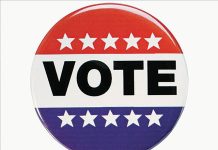Last fall, my wife and I visited the National Constitution Center in Philadelphia.
One of the featured exhibits was “Speaking OUT for Equality: The Constitution, Gay Rights & the Supreme Court.”
It was a well-done, highly visual interactive experience chronicling the struggle for gay rights in America.
We listened attentively as an employee of the center led us around the exhibit and shared examples from the past of society’s intolerance toward the LGBT community.
No visitor could have missed “Speaking OUT,” as it was located next to the main exhibit, “Freedom Rising,” a multi-media performance with live actors and the focal point of a visit to the center.
Another exhibit, “Religious Liberty and the Founding of America,” was tucked away in a corner, easily missed.
In fact, we required assistance from another center employee to find it.
It consisted of a small, dimly lit room, and the displays within featured quotations from various documents and drafts of the First Amendment’s Establishment and Free Exercise Clauses.
It was informative, if you enjoy reading dense columns of 18th century legalese and had access to an online dictionary through a smartphone.
To be sure, I was grateful the religious liberty exhibit was even there, but the contrast with the gay rights exhibit was striking, and the subliminal message it sent was chilling.
Today, religious freedom is viewed with a jaundiced eye by some and dismissed as bigotry by others.
In recent years, the government has imposed fines upon religious organizations that refused to provide abortion-inducing drugs to their employees, even though providing such drugs would violate their sincerely held religious beliefs, not to mention their First Amendment rights.
At the same time, it has become common for large corporations to threaten economic retaliation against states that seek to provide religious freedom protection for small businesses owners.
It was not always this way.
The Religious Freedom Restoration Act, passed by Congress in 1993, had support across the political spectrum — that is, until some upstart florists, bakers and wedding photographers with religious convictions felt conscience-bound to decline participation in certain events and ceremonies they found objectionable.
It was not serving individuals they objected to, but serving in support of ceremonies which their convictions would not allow.
Freedom of religion or conscience is a fundamental right of all Americans — gay, straight and otherwise — the very first freedom enumerated in our Bill of Rights.
Our founders understood religious freedom as God-given, not granted by government nor to be revoked by government.
A robust acknowledgement of the right of conscience benefits everyone, and it is the foundation of our heritage as a free people.
In 1521, when Martin Luther was ordered by the imperial Diet of Worms to disavow his own writings, he refused saying: “I am conquered by the Holy Scriptures quoted by me, and my conscience is captive to the word of God. I cannot and will not recant anything, for to go against conscience is neither right nor safe. Here I stand. I cannot do otherwise. God help me. Amen.”
Whether he actually said “I cannot do otherwise” is a matter of debate, but the sentiment was there regardless, and it meant that his convictions were not simply a matter of preference but of necessity.
Luther was among the first in our modern era to assert the right of conscience, but he was not the last. His stand reverberates down to the present, from civil rights advocates to conscientious objectors to compulsory military service.
In 1786, Thomas Jefferson penned the Virginia Statute for Religious Freedom, which proclaimed: “No man shall be … restrained, molested or bothered in his body or goods, nor shall otherwise suffer on account of his religious opinions or belief.”
The Virginia Statute greatly influenced the Religious Clauses of the First Amendment to the U.S. Constitution, “Congress (and, by implication, any other level of government) shall make no law respecting an establishment of religion, or prohibiting the free exercise thereof.”
The free exercise clause describes an expansive right that goes beyond freedom to worship.
It is the right to live out one’s beliefs in society, in the public square, according to the dictates of one’s conscience.
And as an enumerated constitutional right, it has priority over such questions as “Whom shall I choose to photograph my wedding?”
We the people are the ones to determine what violates our consciences, not the government or corporate lobbyists.
The Rev. John Armstrong is pastor of Grace Lutheran Church in Columbus and can be reached at gracecolumbus.org.




